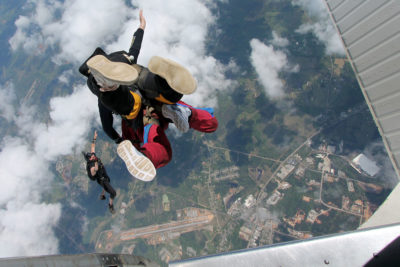Is scuba diving after flying okay? What about flying after scuba diving? Does the order matter? Yes – the order matters a LOT! While exploring the depths of the sea prior to hopping on (or out of) an airplane may seem like your ideal fun-packed day, there can be some serious consequences. Let’s dive into the skydive and scuba topic and answer the question: What happens if you scuba dive and fly on the same day?
Can You Fly And Scuba Dive On The Same Day?
 First of all, we will acknowledge that we’re in Georgia, and hence, we’re landlocked … we know! Fun fact: People can get SCUBA certified in Georgia. Yeah, that’s right, and we don’t want those people checking both types of diving off their bucket lists on the same day.
First of all, we will acknowledge that we’re in Georgia, and hence, we’re landlocked … we know! Fun fact: People can get SCUBA certified in Georgia. Yeah, that’s right, and we don’t want those people checking both types of diving off their bucket lists on the same day.
Technically, you can go scuba diving after flying but it’s generally not recommended. Why? Flying and scuba diving both leave you worn out! It’s more fun, more comfortable and, most importantly, safer to leave the two activities for separate days.
How can you fly and scuba dive on the same day? The only way you can safely be in a plane and below sea level on the same day is if you fly first and scuba second. To be crystal clear: Scuba diving has to come after flying or skydiving.
We’ve also gotten the question “Can you skydive into scuba diving?” And our answer to that is heckkk no, it’s logistically and technologically impossible!
Scuba Diving After flying
There are a number of scientific laws that explain water pressure, gaseous reactions, and how they can all affect the human body. News flash … we’re skydivers not scientists, but we can still break down the basics.
Essentially, the gases that flow throughout our bodies and keep us alive behave properly only in certain environments (AKA, NOT under the pressure of the sea), and when we don’t give them enough time to readjust after swimming with the mermaids and barnacles, the effects can be detrimental. Let’s take a closer look …
Air Pressure
Have you ever swam to the bottom of a swimming pool and felt a little funny compared to how you did a second ago on land? The pressure of water is significantly more than air, and it increases as the depth increases. The lower we go in the ocean, the more pressure there is, and therefore there is a lesser amount of volume for air in our bodies.
What’s the big deal? Pressure affects how well our bodies are able to absorb the gases we’re breathing in. Underwater, these gases are compressed and absorbed into the body a bit differently than they are at sea level.
Off-Gassing
The breathing apparatus required for scuba diving is primarily filled with nitrogen that’s mixed with helium and sweet, sweet oxygen. Off-gassing (also called decompression) refers to the time spent under various levels of pressure to allow the body time to safely expel the nitrogen from the tissues to the blood, to the lungs, and out of the body. If this isn’t done or is done too quickly, the diver can experience the bends.
The Bends
What in the world are the bends? When a scuba diver experiences decompression sickness (“the bends”) their symptoms can range from fatigue and balance problems to paralysis. Like in skydiving, most scuba diving accidents are due to human error rather than equipment failure and are typically preventable – skydivers are scuba divers are both safety-oriented, first and foremost.
What Does All This Have To Do With Skydiving?
 Decompression from below sea level to at sea level is intense on the body, and throwing that same body into a plane and going above sea level is a big no-no.
Decompression from below sea level to at sea level is intense on the body, and throwing that same body into a plane and going above sea level is a big no-no.
Super simply put: Our bodies don’t do well with that drastic pressure change, and even if the scuba diver did all the right things and feels fine on the ground, they can still be subject to decompression sickness if they fly in an airplane too soon after a dive.
How long do you have to wait to skydive after scuba diving? Here’s the breakdown from the Divers Alert Network (DAN) — note that these are the minimal recommended wait times between scuba diving and flying in an airplane:
- A single-day dive with no decompression required: 12+ hours
- Multiple days or repeated dives with no decompression required: 18+ hours
- A dive that requires decompression: 24+ hours
Remember that the longer you wait on land to give your body a moment to chill, the lower the chance of decompression illness coming in hot. When in doubt, wait it out!
If you just skimmed the surface and are still asking, “Why can’t I skydive after I scuba dive?” The simple answer is, your body wasn’t created to be able to. Humans are awesome, but we can only handle so much! So, next time you’re headed to the beach by way of Georgia, stop at Skydive Monroe and jump with us before you hit the briny deep! Blue skies!
Copyright © 2025, Skydive Monroe, All Rights Reserved.
DropZone Web Design & Marketing by Beyond Marketing, LLC



